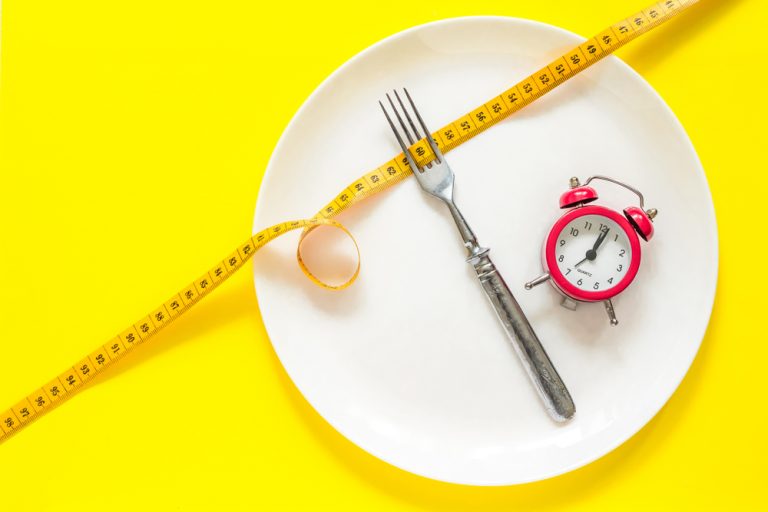The interest in training at the gym, which significantly affect, for example, the improvement and aesthetics of the figure, should be associated with increasing knowledge about nutrition. And so it is more and more often that the exercisers have very good awareness of, among others, quality, degree of processing or composition of products in the diet. A nutritional plan is the basis for all people - not just exercisers. Some of them sometimes use popularly known as fasting. Is it worth to starve? Is this actually a good way to eat? Does it bring any effects?
Starvation diet
What is a hunger? It is a process of fasting, that is, the resignation from eating meals in a liquid and solid form.
During its use, only water is drunk (for the sake of kidneys it is recommended to drink low-mineralized water). The use of fasting leads most often to the sensation of hunger and adaptive reactions of the organism to a state without food.
The first days of fasting are characterized by increased excretion of sodium chloride along with urine. Then the body begins to save this relationship by limiting its secretion. As a result, diuresis increases and edema is reduced.
Other effects of this process are the reduction of blood pressure and the expansion of small arterioles and capillaries. During the first 3 days of fasting, the body begins to expel impurities through the skin and through the mouth.
The symptoms of this process include increased perspiration, coated tongue and unpleasant smell from the mouth. After three days, the above symptoms disappear and the person who is on hunger feels much better. In order for a hunger strike to bring the expected cleansing effects, it should last a minimum of 10 days. It is not recommended to use it over 40 days, because such period may adversely affect the body's work. Of course fasting with a shorter duration also positively affect the body's work, but to a much lesser extent.
A hunger for exercising at the gym may not be good. It is worth remembering that hunger diet is not the best way to reduce body fat - although it allows you to lose a few kilos, it often intensifies the yo-yo effect. What happens to the body during fasting? The body in the first place (as a result of the lack of food) will consume its own, less-needed tissues in order to get energy to satisfy everyday life activities. It will start with old, degenerative and diseased tissues, and the necessary (brain, heart) will leave unchanged. It is logical that people training while applying fasting cleansing the body may feel slightly faster tired and weaker in training - all this as a result of the slowing down of metabolism.
It is recommended to reduce the pace and training loads. It is important to adjust the training to the current capabilities of the body.
It is said that one should not be too afraid of losing muscle mass and excessive protein burning. Increased catabolism may become more severe in lean people when the body has no other energy sources. Is it really so? It's hard to judge.

Fasting - effects
The effects of proper use of fasting can be included
- positive effect during cardiovascular diseases (varicose veins, hypertension)
- assistance in diseases of the digestive system (gastritis, enteritis)
- getting rid of cellulite
- reducing the tendency to respiratory infection
- removal of toxins from the body
- reduction of allergic reactions
- cleansing the body including from accumulated deposits
- reduction of coronary pain
Side effects of hunger strike
Incorrect use of fasting can lead to
- lowering immunity and weakness
- osteoporosis
- anemia
- decrease in libido
- deceleration of metabolism
- anorexia
- skeletal muscle atrophy
- arrhythmias and heart disease
- hypoglycaemic shock
- hormonal disorders (leptin, insulin, ghrelin, serotonin)
- increase in the intensity of fat deposition as a backup material
- increased catabolism
- loss of important micronutrients from the body
Fasting - how much can you lose weight?
How much weight can you lose on hunger? People with large amounts of fat, swelling due to low amounts of exercise and problems with salt excretion can get rid of even 10-13% of body weight within 10 days of fasting. In people who do not have metabolic problems and have a lean physique, fasting can cause weight loss by several kilograms. It should be remembered that in both cases the first 2-3kg lost is the water accumulated in the body.
How to survive fasting?
Maintaining the state of not-eating is not an easy thing - especially for the first three days.
To survive this difficult period, it is recommended to drink a lot of water. It is not strictly defined how much, because each body is different and will need a different amount. It is also important that you do not set yourself a goal too far before proceeding with a fast.
It is worth starting with one-day hunger strikes and increasing the adaptation of the body to this process - extend its duration. The use of a light diet before the start of fasting supports the adaptation of the body to the process of fasting.
Medical fasting - cleansing the body?
A therapeutic fasting is aimed - which is quite surprising - to regenerate the body, whose daily effort associated with maintaining homeostasis leads to the creation of harmful by-products. Most of them are excreted through blood and lymph. However, in the case of accumulation of too many of these products, they accumulate in the body and adversely affect its work. The use of a therapeutic fast removes their excess, and as a result of the fasting, the organism clears and resets its positive state.
Fasting - is it worth to starve?
Fasting is a process that significantly changes the body's work during its lifetime. May it bring the expected results, it is worth going to the doctor in order to obtain information about the availability and how to carry it out. As a result of the use of fasting, it was observed that those who use it feel lighter and more physically and mentally fit. So it is worth applying, but adequate to the possibilities. A poorly introduced hunger to our plan may include impair the well-being and capabilities of the body.






